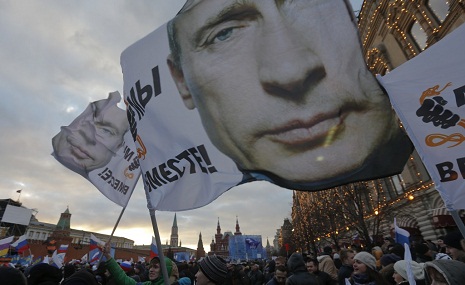As Russia moved into Crimea in March, annexed it and then began to create, promote and support separatist movements in eastern Ukraine, commentators and citizens alike worried about a “new Cold War.” Others compared Russian President Vladimir Putin’s land grab to Nazi Germany’s 1938 annexation of Czechoslovakia’s Sudetenland.
The current crisis, however, is not a Cold War redux, though there are similarities, and Putin likely does not have genocidal ambitions. Today’s situation needs a new analogy. It demands a comprehension of the bigger historical and geopolitical picture, of the internal struggles of countries that, like the former Soviet Union, found themselves suddenly diminished.
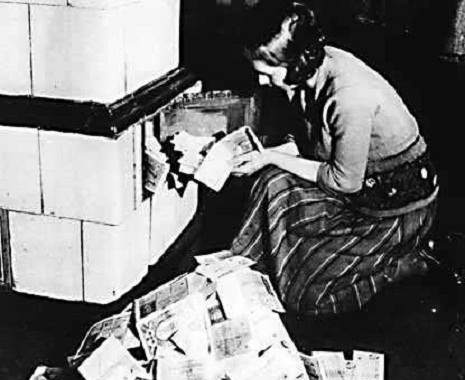
A German woman using banknotes to fuel her fire and keep warm during the hyperinflation in the Weimar Republic during the 1020s. Courtesy of the German National Archives
Perhaps the best historical parallel is post-World War One Germany, known as the Weimar Republic (the 1919 German constitution was written in the city of Weimar). Examining the dynamics of Weimar Germany, and why its people were susceptible to the chauvinistic and nationalistic fervor that swept Germany in the 1930s, can help us understand why Putin’s actions in Ukraine have been so popular among Russian citizens.
The Allied Powers’ treatment of defeated Germany after World War One is viewed as cause and effect to Berlin’s determined resurgence. The international community blamed Germany and its leadership for starting the war, but the Germans themselves did not feel responsible, nor did they feel defeated.
The Great War’s major battlegrounds were outside the German Empire’s borders, and most Germans never saw the brutal reality and utter destruction of the war on their soil. They grew more embittered when the Treaty of Versailles that ended the war burdened the Weimar Republic with vast reparations, forced it to disarm and denuded it of large swathes of territory — including an important coal region.
The result was a disgraced and frustrated German polity. These feelings were only exacerbated by the hyperinflation that soon stunned the German economy, followed by the global Great Depression that then took hold. To the detriment of the whole world, Adolf Hitler’s National Socialist Movement was able to capitalize on those resentments with promises of a rebuilt and respected Germany.
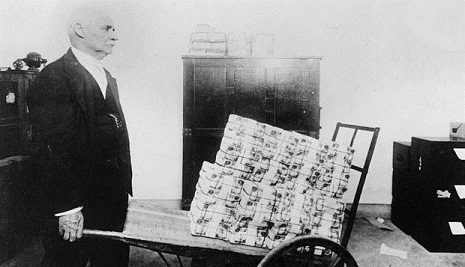
German banker taking his money to tellers during the hyperinflation in the Weimar Republic during the 1920s. Courtesy of the German National Archives.
The 23 years since the disintegration of the Soviet Union have seen the growth of similar feelings among the Russian people. For the West, the fall of the Berlin Wall may have meant the unity of Germany and the eventual independence of all the 15 Soviet republics and the seven Soviet bloc countries. But for Russia it meant the end of an empire and the loss of superpower status.
No reparations were imposed on Russia, nor was it forced to disarm. But without a shot being fired, Russians were told they had been defeated, that they had lost the Cold War. Where the West saw the triumph of capitalism over communism and democracy over authoritarianism, the Russian people — like Germans in 1919 — saw only their humiliation on the world stage.
The West saw the fall of the Iron Curtain and the freedom and democratization of much of Central and Eastern Europe, but Russians saw the collapse of stability and the embarrassing and ignominious end of 1,000 years of the Russian Empire.
For Russians, the experience of the 1990s only deepened the sense of their collective disgrace. Russian President Boris Yeltsin’s drunken antics made him an international laughingstock, the Russian economy went through a currency crisis, ordinary people struggled to survive. As the crisis in Kosovo demonstrated, Moscow no longer wielded its former clout in the United Nations Security Council. It had become Weimar Russia: an ignored and diminished nation with the suppressed sentiments of an empire.
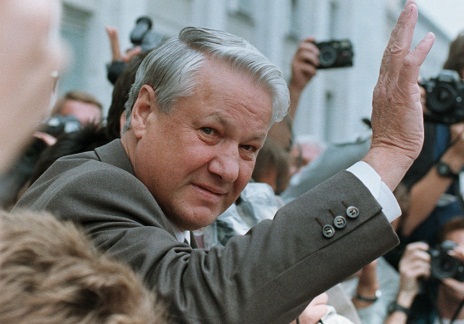
Russian President Boris Yeltsin waves from the balcony of the Russian Parliament to demonstrators protesting the overthrow of Soviet President Gorbachev during the brief coup, in Moscow, August 20, 1991.
Putin, like all Russians, felt these insults (real or perceived) keenly. As president, he has expertly capitalized on Russian nostalgia for a time when they were respected and feared, and with his “19th-century” style projection of power, has successfully given Russians a reason to be proud again.
The West has long hoped that Russia would come and join its ranks. That Moscow could again be a part of the order established in Western Europe in 1945 and spread to Eastern Europe after 1989.
The United States and Europe brought to post-Soviet Russia many of the same programs that had helped democratize, liberalize and capitalize the formerly Soviet or Soviet-bloc countries of Poland, Latvia and Slovakia. But they never took in Russia, and the West cannot seem to grasp why.
Like Weimar Germany, post-Soviet Russia is not prepared to accept a peace settlement that it feels has been forced on it. It did what it had to do in a time of weakness, but Moscow is now announcing that Russia will not live in a world where it must play second fiddle to the West.
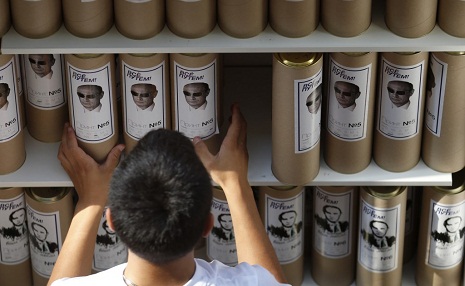
A shop assistant prepares cases containing T-shirts printed with images of Russia’s President Vladimir Putin, for sale at GUM department store in central Moscow, August 11, 2014.
Putin is seeking a reexamination of the post-1991 rules. He wants Russia to be considered in the same breath as China or the United States. Unless the West finds the gumption to push back, he might just get his way.








